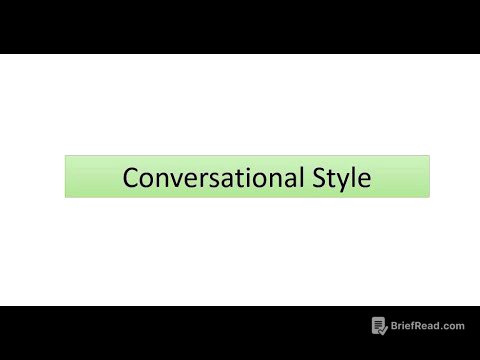TLDR;
This video discusses Donald Trump's tariff policies, their historical roots, and their impact on international relations and the U.S. economy. It examines the motivations behind these policies, including securing political support, addressing trade deficits, and countering China's economic influence. The video also explores the negative consequences, such as strained relationships with allies and potential economic burdens on consumers and businesses.
- Trump's tariff policies are rooted in historical protectionist measures, particularly those of President William McKinney.
- The policies aim to revive manufacturing in the Rust Belt, secure political support, and address trade deficits.
- These tariffs have strained relationships with allies like Canada and led to retaliatory measures from countries like China.
- The long-term effectiveness of tariffs in resolving economic issues is questioned, with potential negative impacts on consumers and businesses.
Trump's Tariff Policies: An Overview [0:03]
The video starts by highlighting Trump's stance on trade, which involves imposing tariffs on wealthy countries like Japan rather than taxing the American people. This approach is consistent with his long-held views, dating back to the 1980s when he criticized free trade policies for not protecting American interests. Trump's tariff philosophy is rooted in the economic policies of former President William McKinney, during the "Gilded Age" (1870-1913), a period of significant economic growth in the U.S.
Historical Context and Economic Impact [0:31]
Experts argue that America's growth during the McKinney era was due to multiple factors, not just tariffs, including immigration, natural resource development, and technological innovation. The video questions whether historical tariff policies can be effectively applied to today's interconnected global economy. Trump's reciprocal tariffs are viewed as protectionist measures that threaten other countries, straining relationships with allies like Canada.
Strained Relationships with Allies [0:38]
Trump's tariff policies have significantly strained relationships with America's allies, particularly Canada. He mocked Canada, suggesting it become the 51st state if it didn't want to pay tariffs. This tension has led to symbolic protests, such as renaming "Americano" coffee to "Canadiano" in Canada. A boycott of American products is spreading, with people sharing lists of American goods to avoid and suggesting alternatives.
Motivations Behind Trump's Tariff Policies: Political Strategy [2:57]
One of the primary reasons behind Trump's tariff policy is to secure a stable political position. The Rust Belt, a region of declining industrial cities in the northeastern and midwestern United States, played a crucial role in the 2016 presidential election. Trump promised to revive manufacturing and create jobs in this region, which had been losing factories to countries with lower wages like China and Mexico. This promise helped him win over white middle-class workers who felt neglected by the government.
Motivations Behind Trump's Tariff Policies: Securing Finances [4:33]
Trump's tariff policies also aim to secure finances for the U.S., which faces a high trade deficit and fiscal deficit, known as "twin deficits." The U.S. national debt has doubled in nine years, reaching over $36 trillion in 2024. Trump has ordered agency spending audits and called for government streamlining to reduce the deficit. However, experts argue that tariffs alone cannot resolve the twin deficits and may have short-lived effects.
Motivations Behind Trump's Tariff Policies: Countering China [6:36]
Trump is using tariffs to check China's growing economic power, which he sees as a threat to the United States. He has raised tariffs on Chinese imports, leading to retaliatory measures from China, such as halting exports of rare earth minerals and magnets to the U.S. The U.S. relies on China for a significant portion of its imports, making the tariff war unpredictable.
Impact and Future of Trump's Tariff Policies [7:34]
Trump's tariff policies have led to a decline in his approval ratings. He has threatened to impose tariffs on smartphones and raise tariffs on imported iron ore pipes. The export situation for countries like Korea is expected to worsen. Despite the negative impacts, Trump seems determined to continue playing the game his way, indicating that his tariff policies may persist.
![[#벌거벗은세계사] 세계 경제를 흔든 미국의 고관세 정책💵 트럼프가 고관세에 집착하는 이유 '매킨리 관세법'은 무엇인가❓](https://wm-img.halpindev.com/p-briefread_c-10_b-10/urlb/aHR0cDovL2ltZy55b3V0dWJlLmNvbS92aS90NVh5TUJhQ0pfYy9tYXhyZXNkZWZhdWx0LmpwZw==.jpg)








